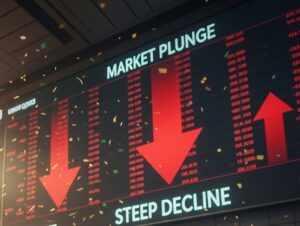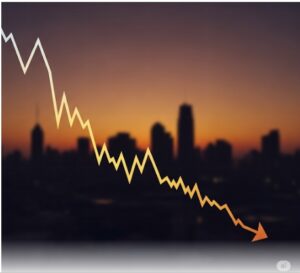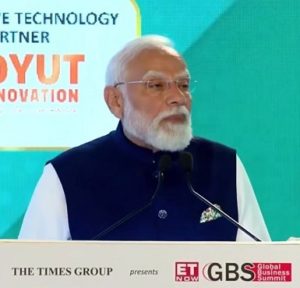
Last Updated on August 1, 2025 7:43 am by BIZNAMA NEWS
Benchmark domestic equity indices today ended the month’s first trading session in negative territory. Renewed concerns over US President Donald Trump’s new tariffs on Indian exports, weak global cues, and persistent foreign fund outflows weighed on investors’ sentiment.
- Sensex shed 586 points, or 0.72 per cent, to close at 80,600.
- Nifty fell 203 points, or 0.82 per cent, to settle at 24,565.
The broader market indices at the Bombay Stock Exchange also closed with deeper cuts, with the Mid-Cap index slipping around 1.3 per cent and the Small-Cap index losing about 1.7 per cent.
In the Sensex pack, 24 out of 30 companies ended with losses. Among the top laggards, Sun Pharma lost 4.5 per cent, Tata Steel dropped over 3 per cent, and Maruti dipped more than 2.6 per cent. Among the top gainers, Trent surged over 3.2 per cent, Asian Paints climbed 1.4 per cent, and Hindustan Unilever advanced around 1.2 per cent.
In Sectoral indices at the BSE, FMCG bucked the trend, rising over 0.4 per cent, while all other sectors ended low. In top laggards, Healthcare and Telecommunication both slipped over 2.4 per cent each, Metal and Oil & Gas declined more than 1.9 per cent, and Focused IT fell around 1.9 per cent.
The BSE Sensex plunged 586 points, or 0.72%, to close at 80,600, while the NSE Nifty 50 dropped 203 points, or 0.82%, settling at 24,565. Broader markets witnessed sharper declines, with the BSE MidCap index falling 1.4% and the SmallCap index losing 1.6%, reflecting deeper stress in secondary counters.
Weak global cues, particularly fears of a new wave of protectionist policies from the United States, added to domestic concerns over capital outflows and earnings uncertainties.
In the Sensex pack, 24 of 30 constituents ended in the red. Sun Pharma was the worst performer, sliding 4.5%, followed by Tata Steel (–3%) and Maruti Suzuki (–2.6%). On the other hand, select defensives offered some support, with Trent gaining 3.2%, Asian Paints rising 1.4%, and Hindustan Unilever up 1.2%.
Sectorally, FMCG was the lone gainer, advancing 0.4%, reflecting investor preference for safer bets. In contrast, Healthcare and Telecom sectors fell over 2.4%, while Metals, Oil & Gas, and Focused IT declined around 1.9% each.
Analysts warn of continued volatility in the near term, as geopolitical tensions, U.S. trade rhetoric, and FII activity remain key triggers.








